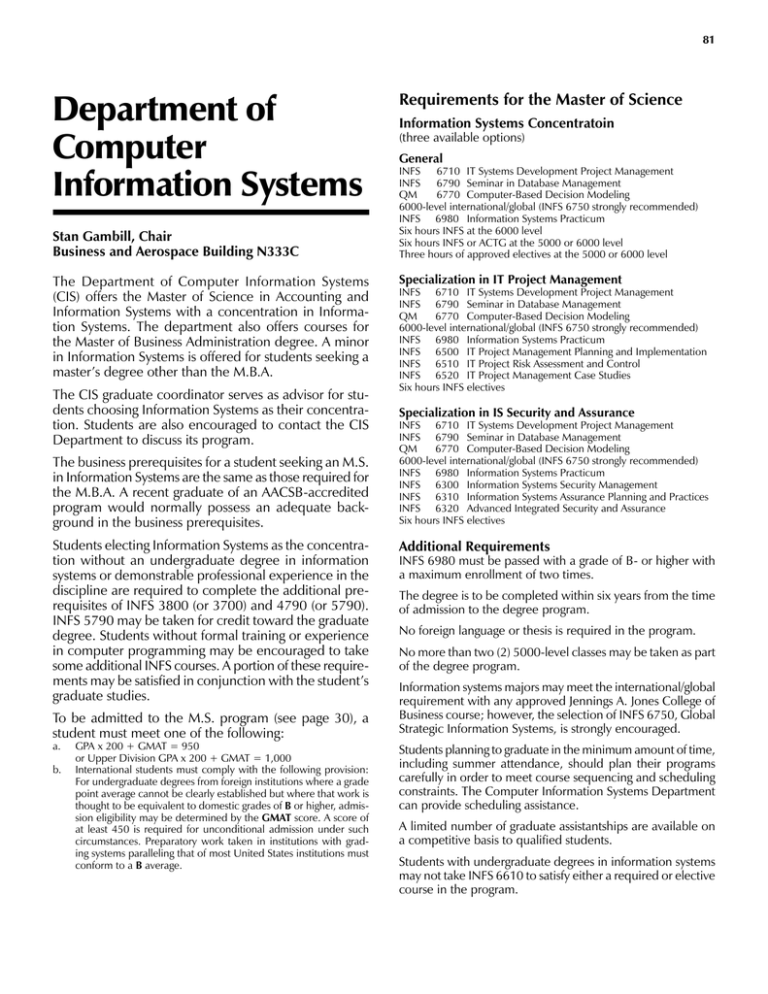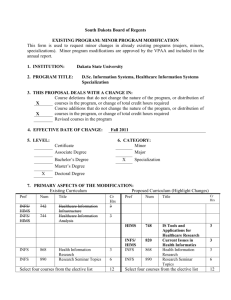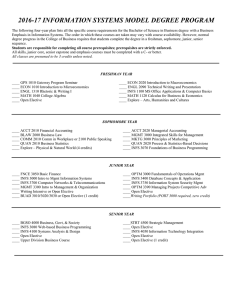Department of Computer Information Systems Requirements for the Master of Science
advertisement

Department of Computer Information Systems Stan Gambill, Chair Business and Aerospace Building N333C The Department of Computer Information Systems (CIS) offers the Master of Science in Accounting and Informa­tion Systems with a concentration in Information Systems. The department also offers courses for the Master of Business Administration degree. A minor in Informa­tion Systems is offered for students seeking a master’s degree other than the M.B.A. The CIS graduate coordinator serves as advisor for students choosing Information Systems as their concentration. Students are also encouraged to contact the CIS Department to discuss its program. The business prerequisites for a student seeking an M.S. in Information Systems are the same as those required for the M.B.A. A recent graduate of an AACSB-accredited program would normally possess an adequate background in the business prerequisites. Students electing Information Systems as the concentration without an undergraduate degree in information systems or demonstrable professional experience in the discipline are required to complete the additional prerequisites of INFS 3800 (or 3700) and 4790 (or 5790). INFS 5790 may be taken for credit toward the graduate degree. Students without formal train­ing or experience in computer programming may be encouraged to take some additional INFS courses. A por­tion of these requirements may be satisfied in conjunc­tion with the student’s graduate studies. To be admitted to the M.S. program (see page 30), a student must meet one of the following: a. b. GPA x 200 + GMAT = 950 or Upper Division GPA x 200 + GMAT = 1,000 International students must comply with the following provision: For undergraduate degrees from foreign institutions where a grade point average cannot be clearly established but where that work is thought to be equivalent to domestic grades of B or higher, admission eligibility may be determined by the GMAT score. A score of at least 450 is required for unconditional admission under such circumstances. Preparatory work taken in institutions with grading systems paralleling that of most United States institutions must conform to a B average. Computer Information Systems 81 Requirements for the Master of Science Information Systems Concentratoin (three available options) General INFS 6710 IT Systems Development Project Management INFS 6790 Seminar in Database Management QM 6770 Computer-Based Decision Modeling 6000-level international/global (INFS 6750 strongly recommended) INFS 6980 Information Systems Practicum Six hours INFS at the 6000 level Six hours INFS or ACTG at the 5000 or 6000 level Three hours of approved electives at the 5000 or 6000 level Specialization in IT Project Management INFS 6710 IT Systems Development Project Management INFS 6790 Seminar in Database Management QM 6770 Computer-Based Decision Modeling 6000-level international/global (INFS 6750 strongly recommended) INFS 6980 Information Systems Practicum INFS 6500 IT Project Management Planning and Implementation INFS 6510 IT Project Risk Assessment and Control INFS 6520 IT Project Management Case Studies Six hours INFS electives Specialization in IS Security and Assurance INFS 6710 IT Systems Development Project Management INFS 6790 Seminar in Database Management QM 6770 Computer-Based Decision Modeling 6000-level international/global (INFS 6750 strongly recommended) INFS 6980 Information Systems Practicum INFS 6300 Information Systems Security Management INFS 6310 Information Systems Assurance Planning and Practices INFS 6320 Advanced Integrated Security and Assurance Six hours INFS electives Additional Requirements INFS 6980 must be passed with a grade of B- or higher with a maximum enrollment of two times. The degree is to be completed within six years from the time of admission to the degree program. No foreign language or thesis is required in the program. No more than two (2) 5000-level classes may be taken as part of the degree program. Information systems majors may meet the international/global requirement with any approved Jennings A. Jones College of Business course; however, the selection of INFS 6750, Global Strategic Information Systems, is strongly encouraged. Students planning to graduate in the minimum amount of time, including summer attendance, should plan their programs carefully in order to meet course sequencing and scheduling constraints. The Computer Information Systems Department can provide scheduling assistance. A limited number of graduate assistantships are available on a competitive basis to qualified students. Students with undergraduate degrees in information systems may not take INFS 6610 to satisfy either a required or elective course in the program. 82 Computer Information Systems Courses in Information Systems [INFS] 5200 Data Enhanced Internet Applications. Three credits. Prerequi­ sites: 6 hours of information systems. Focus on designing, deploying, maintaining, and querying an Internet database using appropriate hardware and software. In-depth study of e-commerce applications in a microcomputer environment. 5760 Advanced Programming. Three credits. Prerequisite: INFS 2720. Functional programming experience in structured program­ming techniques; top-down design; advanced file handling and maintenance techniques to include sequential, indexed sequential, direct, and relative file organization; interactive, menu-driven applications; and uploading/downloading pro­grams to a central site. Requires extensive laboratory work. will combine and apply the principles from security and assurance into proactive planning that attains compliance, efficiency, and effectiveness. 6500 IT Project Management Planning and Implementation. Three credits. Planning and implementation issues such as project planning and selection, portfolio management, problem solving, communication, conflict resolution, change management, and leadership. Includes a substantial emphasis on organizational and people issues in project management. 6510 IT Project Risk Assessment and Control. Three credits. Elements involved in identifying and mitigating IT project risks. Offers preparation to monitor project progress, identify and quantify the impact of risks, evaluate the degree to which a program is troubled, and apply appropriate decision strategies to problematic situations. 5790 Database Design and Development. Three credits. Prerequisite: 6 hours of information systems. Fundamental concepts: conventional data systems, integrated management information systems, database structure systems, data integration, complex file structure, online access systems. Emphasis on total integrated information systems database and database management languages. 6520 IT Project Management Case Studies. Three credits. Integrates all areas of IT project management into a coherent analysis. Covers topics, situations, and problems using case study techniques. Includes the development of project management software skills. 5830 Database Programming. Three credits. Prerequisite: INFS 4790 or 5790 or consent of instructor. Operational database design and implementation. Includes the development of interfaces that enable end users to query the database contents and transform data into information. Requires each student to participate fully in a group project. 6610 Information Systems Management and Applications. Three cred­its. Focuses on the use of computing resources in managerial context. Students will develop an understanding of issues and implica­tions of information resources and end-user computing as well as develop skills in application of these concepts in a problem-solving oriented microcomputer system environment. NOT open to students with an undergraduate degree in Information Systems. 5840 Study Abroad. Three credits. Prerequisites: Graduate standing and completion of core courses in respective field as determined by graduate business studies. A short-term international business education experience designed to expose the student to the economic, political, cultural, and social environments of a foreign country(ies), with specific emphasis directed toward the international state/status of the subject matter pertinent to the discipline. 5900 Business Data Communications. Three credits. Prerequisite: 6 hours of information systems. Current topics in the field of data communications. 6010 Survey of Information Systems Issues. Three credits. Topics include Systems Development Life Cycle (SDLC), Data Resource Management, and Information Resource Management. Incor­ porates various microcomputer applications software packages. May not be used for elective credit in graduate business degree programs. 6300 Information Systems Security Management. Three credits. A comprehensive view of the managerial concepts for security. Includes strategic alignment of security initiatives with business objectives; identification and assessment of information security risks; design, development, and management of an information security program; and the development and management of the response and recovery from disruptive and destructive information security events. 6310 Information Systems Assurance Planning and Practices. Three credits. Planning and application of information systems assurance. Focuses on risk assessment, compliance of standards and regulatory requirements, and effective use of system development and use of new IT technologies and processes. 6320 Advanced Integrated Security and Assurance. Three credits. Prerequisite: INFS 6300, 6310, or permission of instruction. An integrated approach to the development, implementation, and assurance of an information system security program. Students 6620 Advanced Computer Applications for Business. Three credits. Advanced application development in an end-user computing environment. Opportunity to develop skills in building applications to support management activities in the information age. Includes database systems, electronic spreadsheets, and other appropriate application environments. 6710 IT Systems Development Project Management. Three credits. Prerequisite: Previous coursework or experience in systems analysis. Practical explanation of the total systems concept and a knowledge of systems development. Addresses the entire development cycle including analysis, design, and implementation. Includes an emphasis on project management. 6720 Knowledge Management. Three credits. Strategic value of knowledge as a critical organizational asset, design of effective knowledge management systems, and implementation of knowledge management programs for organizations operating in the highly competitive knowledge economy. 6740 Strategic Information Systems. Three credits. Focuses on the use of information system (IS) and information technology (IT) in the strategic management process in business organizations. Emphasis on the strategic view of IS and IT and their impact on organizational strategy. Use of IS and IT to support prominent generic strategy models and how IS and IT aid applying the principles of those generic strategic models. 6750 Global Strategic Information Systems. Three credits. Examines the managerial, operational, and strategic implications of information and communication technology in the global context. Particular emphasis on the strategic dimension. 6760 Programming Applications. Three credits. Beginning to advanced topics in computer programming. Structured programming approach emphasized as students write application programs for an increasingly difficult series of exercises. 6790 Seminar in Database Management. Three credits. Prerequisite: Previous database coursework or experience. Advanced topics in computer-related information systems as found in current literature and practical application. Advanced information structures and data management concepts applied in the design of computerbased information systems. Additional topics include data structures as applied to distributed processing systems, computer system component resource allocation, and data communication systems design. Significant computer application projects required. 6880 Electronic Commerce. Three credits. The business and technical implications of electronic commerce from the perspective of the manager of information technology. Introduces the technical, business, managerial, and social issues associated with electronic commerce systems. Addresses the role of information technology in the development of electronic commerce applications and considers the ethical and legal implications of electronic commerce. 6900 Business Data Communication Management. Three credits. Management and use of data communications technologies to support the operations of businesses. Practical experiences in the use of data communications technologies, such as local area networks, the Internet, distributed computing, and distributed databases. 6980 Information Systems Practicum. Three credits. Prerequisites: 6 hours of information systems or permission of instructor. Emphasizes communication skills, creative thinking, problem solving, and professional responsibility from a leadership perspective. Includes the discussion of information systems assessment in organizations. Capstone course for Information Systems majors and must be taken the last semester prior to graduation. 6990,6991 Independent Research in Information Systems. Three credits. Prerequisites: Consent of graduate program coordinator or department chair. Provides individual research, readings analysis, or projects in contemporary problems and issues in a concentrated area of study under the direction of an appropriate faculty member. Maximum credit applicable toward degree may not exceed six credits. Courses in Quantitative Methods [QM] 6000 Quantitative Methods Survey. Three credits. Quantitative methodologies to assist in the decision-making process. Emphasis on applied statistics and decision sciences topics that are practical, useful, and of wide application for business analysis. May not be used for elective credit in graduate business degree program. 6770 Computer-Based Decision Modeling. Three credits. Advanced techniques in quantita­tive methods. Modeling and optimization techniques. Compu­ter applications emphasized. 6960 Statistical Methodology and Analysis. Three credits. Prerequi­site: QM 3620 or 6000. Descriptive and inferential statistical concepts with the use of expert systems to assist in the selection of appropriate design and methodology. Usage of common packages for problem solution and analysis. Computer Information Systems 83



